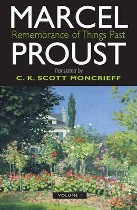 Marcel Proust •
Marcel Proust •
Remembrance of Things Past
(also published as In Search of Lost Time) •
Three things tend to put people off Proust: his reputation (formidable), his native tongue (French), and the sheer length of his work (Remembrance of Things Past, considered his masterpiece, runs to seven hefty volumes).
I’m happy to say that none of this has to deter you. To address these objections in reverse order:
The length: Who says you have to read the whole thing? A mere dozen pages into Swann’s Way, the opening volume, you arrive at the wonderful image of Marcel’s grandmother striding up and down garden paths during a thunderstorm, head thrown back to let the rain cascade down her face. Or dip into the second volume, Within a Budding Grove, to find a troupe of young girls on the beach in their white dresses, leapfrogging over a startled man in a yachting cap. Every page of Proust makes you feel like you’re visiting an Impressionist exhibit.
The French: It’s been translated.
The reputation: This is not elitist literature it requires profound study to appreciate; it’s the story of one ordinary life, told in accessible language, with an extraordinary wealth of detail.
One passage in Swann’s Way deals with the narrator’s thrill over going to the theater for the first time, and the difficulty he has afterward in reconciling the reality with his expectation. Substitute any eagerly awaited event from your own life, and you see Proust’s genius at work. Most of us bury our disappointment; Proust puts his under the microscope and examines it until he’s probed every conceivable aspect of anticipation and letdown.
And then he moves on to the next incident in his life and turns his magnifying glass on that.
No wonder it took him seven volumes.





Okay, you got me. I want to read this. Equally important: I want to read only part of it, which never occurred to me.
Thanks, I’m convinced now, too, to give him more than a whirl.